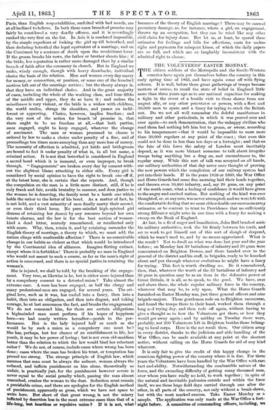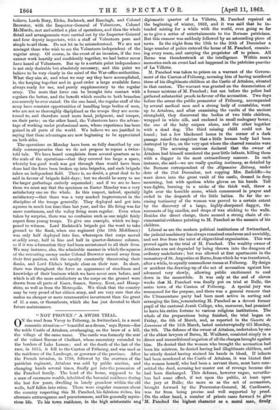THE VOLUNTEERS' EASTER MONDAY.
THE citizen soldiers of the Metropolis and the South-Western .1 counties have again put themselves before the country in this early spring time of 1863, and have again come off with flying colours. It is well, before these great gatherings of troops become matters of course, to recall the state of belief in England little more than three years ago as to our national capacities for making a fight in the event of a hostile visit to these shores from our august ally, or any other potentates or powers. with a fleet and 50,000 men to spare, and a fancy for trying to crack the British nut. Do we not all well remember the doleful manifestoes in military and other periodicals, in which it was proved over and over again—to such demonstration, that the unhappy civilian who read them had nothing left him but to groan, or swear, according to his temperament —that it would be impossible to mass more than 30,000 regulars at any point of the coast ; that even this could not be done in less than ten days or a fortnight; and that-on the fate of this force the safety of London must inevitably depend, as it was mere blatant nonsense to talk about irregular troops being anything but a drag on, and encumbrance to, the regular army. While this sort of talk was accepted on all hands, our military authorities of that day never once thought of proving the new powers which the completion of our railway system had put into their hands. If in the years 1859 or 1860, the War Office and Horse Guards had some fine morning laid their heads together, and thrown even 10,000 infantry, and, say 20 guns, on any point of the south coast, what a feeling of confidence it would have given to the angry and excited nation. But nothing of the kind was ever thoughtof, or, at any rate, was never attempted; and we wereleft with the comfortable feeling that we must either double our enormousarmy estimates, or be content to trust to Providence that no sufficiently strong filibuster might arise in our time with a fancy for making a swoop on the Bank of England.
At last, in a fit of anger and humiliation, John Bull brushed aside his military authorities, took the bit firmly between his teeth, and set to work to get himself out of this sort of slough of despond, which he wasn't used to, and by no means appreciated. What is the result ? Not to dwell on what was done last year and the year before ; on Monday last 39 battalions of infantry and 30 guns were concentrated on Brighton Downs, and there handed over to the general of the district and his staff, in brigades, ready to be knocked about and put through whatever evolutions he might have a fancy for trying. This fact is worth dwelling on. Be it remembered, then, that, whatever the worth of the 39 battalions of infantry and 30 guns in question may be as an item in the defensive power of Great Britain, it is all, so to speak, to the good. We have, over and above these, the whole regular military force in the country, whatever that may be, to rely upon. What the Horse Guards furnished on Easter Monday was, just three general officers and nine brigade-majors. These gentlemen rode on to Brighton racecourse, and found the troops there to their hand, worked them through a long aild trying day, and then rode off again, without having to give a thought as to how the Volunteers got there, or how they would get away again ; and by midday on Tuesday there were, probably, not 200 Volunteers left in Brighton besides those belong- ing to local corps. Here is the net result then. Our citizen army in every district, thanks to the judicious and able handling of the War Office, can be made available at any point at the shortest notice, without calling on the Horse Guards for aid of any kind whatever.
It is only fair to give the credit of this happy change in the conscious fighting power of the country where it is due. For three years the Volunteers have been handled by the War Office with rare tact and ability. Notwithstanding the combustible nature of the force, and the exceeding difficulty of getting many thousand men, over whom you have really no hold, to work together; in spite of the natural and inevitable jealousies outside and within the force itself, we see these huge field days carried through one after the other, in all parts of the country, not only without a break-down, but with the most marked success. Take Easter Monday as a sample. The application was only made at the War Office a fort- night before. A committee of commanding officers, including, we
believe, Lords Bury, Elcho, Raclstock, and Ranelagb, and Colonel Brewster, with the Inspector-General of Volunteers, Colonel McMurdo, met and settled a plan of operations, and then the whole detail and arrangements were carried out by the Inspector-General and four deputy inspectors, with a staff of Volunteers pure and simple to aid them. Do not let us be misunderstood. We are not amongst those who wish to see the Volunteers independent of the regular army. Of course, in the event of an invasion, if the two cannot work heartily and confidently together, we had better never have beard of Volunteers. But up to a certain point independence is not only desirable but absolutely necessary, and this point we believe to be very clearly in the mind of the War-office authorities. What they aim at, and what we may say they have accomplished, is, the keeping together and in good order a large available force always ready for use, and purely supplementary to the regular army. The more that force can be brought into contact with regulars the better, and the benefit which results to both branches can scarcely be over stated. On the one hand, the regular staff of the army have constant opportunities of handling large bodies of men, who are not so thoroughly dieciplined as the troops they are accus- tomed to, and therefore need more head, judgment, and temper, on their parts ; on the other hand, the Volunteers have the advan- tage of working under professional men, whose experience has been gained in all parts of the world. We believe we are justified in saying that these advantages are now beginning to be appreciated on both aides.
The operations on Monday have been so fully described by our daily contemporaries that we do not propose to repeat a twice- told tale. We have heard complaints from several quarters as to the scale of the operations--that they covered too large a space, whereby less good work was got through than would have been done had the force been broken up into brigades, and each brigade taken an independent field. There is, no doubt, a great deal to be said in favour of brigade field-days ; but we should be sorry to see the larger gatherings entirely superseded ; and if we are to have them we must say that the specimen on Easter Monday was a very satisfactory one on the whole. In this respect, indeed, specially satisfactory—that there was a very marked improvement in the discipline of the troops generally. They deployed and got into squares in much less time than last year, and the file firing was far more continuous, and the volley firing more regular. Even when taken by surprise, there was no confusion such as one might fairly expect from young troops. To give one example, which we hap- pened to witness. Lord Radstock's brigade got the word to take ground to the flank, when one regiment (the 19th Middlesex) was only half deployed into line, whereupon that corps moved stmdily away, half in line and half in quarter-distance column, as if it was a formation they had been accustomed to all their lives. We may instance, also, the admirable manner in which the squares of the retreating enemy under Colonel Brewster moved away from their first position, with the cavalry constantly threatening their flanks, and Lord Elcho's brigade close on their rear. In short, there was throughout the force an appearance of steadiness and knowledge of their business which we have never seen before, and which is all the more satisfactory as the corps on the ground were drawn from all parts of Essex, Sussex, Surrey, Kent, and Hamp- shire, as well as from the Metropolis. We think that the country may be very proud of her citizen army, and are very sure that she makes no cheaper or more remunerative investment than the grant of 1/. a man, or thereabouts, which she has just devoted to their future maintenance.































 Previous page
Previous page